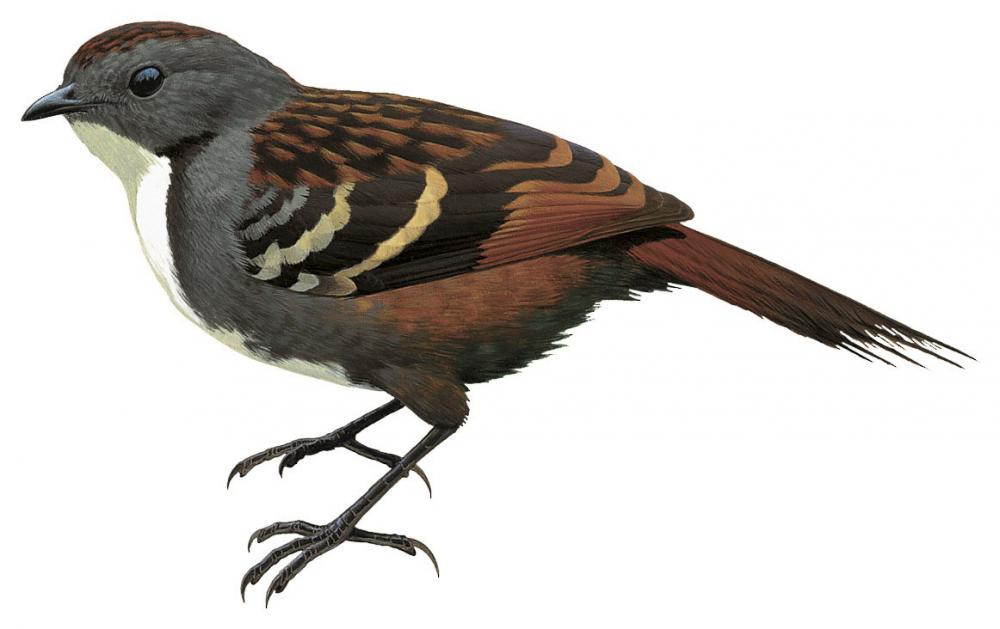Papuan Logrunner / Orthonyx novaeguineae

Papuan Logrunner
SCI Name:
Protonym: Orthonyx Novae Guineae Sitz.K.Akad.Wiss.Wien 69 p.83
Taxonomy: Passeriformes / Orthonychidae / Orthonyx
Taxonomy Code: norlog1
Type Locality: Arfak Mountains, New Guinea.
Author: Meyer, AB
Publish Year: 1874
IUCN Status: Least Concern
DEFINITIONS
ORTHONYX
(Orthonychidae; Ϯ Australian Logrunner O. temminckii) Gr. ορθος orthos straight; ονυξ onux, ονυχος onukhos claw; "ONGUICULÉ, Orthonyx. (Temm.) ... Ongles plus longs que les doigts, forts, peu arqués, cannelés latéralement" (Temminck 1820); "Orthonyx Temminck, 1820, Man. Orn., éd. 2, 1, p. 81. No species; generic details only. Type, by subsequent designation (Ranzani, 1822, Elem. Zool., 3, p. 19), Orthonyx temminckii Ranzani." (Deignan in Peters 1964, X, 228).
Var. Orthonix.
Synon. Macrorthonyx, Papuorthonyx.
orthonyx
Gr. ορθος orthos straight; ονυξ onux, ονυχος onukhos claw.
novaeguinae / novaeguineae / novaeguineensis
L. novus new; Mod. L. Guineensis Guinean < Guinea Guinea, West Africa; i.e. New Guinea (first named Nueva Guinea in 1545 by the Spanish explorer Ortíz de Retes, because aborigines in the Mamberano region reminded him of those he had encountered earlier in African Guinea).
● ex “Lori noir de la Nouvelle Guinée” of Sonnerat 1776, and “Black Lory” of Latham 1781 (syn. Chalcopsitta atra).
● ex “Choucas de la Nouvelle Guinée” of d’Aubenton 1765-1781, pl. 269, and “New-Guinea Crow” of Latham 1781 (syn. Coracina striata).
● Erroneous TL. New Guinea (= New South Wales); ex “Grand Martin-pêcheur de la Nouvelle Guinée” of Sonnerat 1766, “who had received the specimen from Cook’s botanist, Joseph Banks, at Cape Town. Sonnerat had never travelled to either New Guinea or Australia” (Robin 2001) (Dacelo).
● ex “Crabier de la Nouvelle Guinée” of d’Aubenton 1765-1781, pl. 926, “Crabier noir” of de Buffon 1770-1786, and “New Guinea Heron” of Latham 1785 (syn. Egretta sacra).
● ex “Caille de la nouvelle Guinée” of Sonnerat 1776, and “New Guinea Quail” of Latham 1783 (unident.).
SUBSPECIES
Papuan Logrunner (novaeguineae)
SCI Name: Orthonyx novaeguineae novaeguineae
novaeguinae / novaeguineae / novaeguineensis
L. novus new; Mod. L. Guineensis Guinean < Guinea Guinea, West Africa; i.e. New Guinea (first named Nueva Guinea in 1545 by the Spanish explorer Ortíz de Retes, because aborigines in the Mamberano region reminded him of those he had encountered earlier in African Guinea).
● ex “Lori noir de la Nouvelle Guinée” of Sonnerat 1776, and “Black Lory” of Latham 1781 (syn. Chalcopsitta atra).
● ex “Choucas de la Nouvelle Guinée” of d’Aubenton 1765-1781, pl. 269, and “New-Guinea Crow” of Latham 1781 (syn. Coracina striata).
● Erroneous TL. New Guinea (= New South Wales); ex “Grand Martin-pêcheur de la Nouvelle Guinée” of Sonnerat 1766, “who had received the specimen from Cook’s botanist, Joseph Banks, at Cape Town. Sonnerat had never travelled to either New Guinea or Australia” (Robin 2001) (Dacelo).
● ex “Crabier de la Nouvelle Guinée” of d’Aubenton 1765-1781, pl. 926, “Crabier noir” of de Buffon 1770-1786, and “New Guinea Heron” of Latham 1785 (syn. Egretta sacra).
● ex “Caille de la nouvelle Guinée” of Sonnerat 1776, and “New Guinea Quail” of Latham 1783 (unident.).
Papuan Logrunner (dorsalis)
SCI Name: Orthonyx novaeguineae dorsalis
dorsale / dorsalis
L. dorsalis (properly dorsualis) dorsal, of the back < dorsum back.
● ex “Chorlito à dos noir” of de Buffon (Sonnini ed.) 1800-1802 (syn. Calidris melanotos).
Papuan Logrunner (victorianus)
SCI Name: Orthonyx novaeguineae victorianus
victoriana / victorianus
● Victoria, Australia (syn. Elanus scriptus).
● Mt. Victoria, Wharton Range, south-eastern New Guinea (subsp. Orthonyx novaeguineae).
UPPERCASE: current genus
Uppercase first letter: generic synonym
● and ● See: generic homonyms
lowercase: species and subspecies
●: early names, variants, mispellings
‡: extinct
†: type species
Gr.: ancient Greek
L.: Latin
<: derived from
syn: synonym of
/: separates historical and modern geographic names
ex: based on
TL: type locality
OD: original diagnosis (genus) or original description (species)












